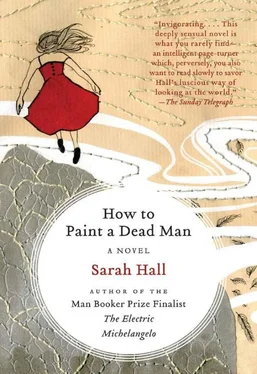If she had imagined a pitch-black terror, like being lost in the mines of Massa, or trapped in the excavated tunnels of the Metropolitana, if she had thought her blindness would be like living in the dark, cracked varnish of the Deposition in the church of San Lorenzo, it was not so. After they had gone, Annette got out of bed and wobbled for a moment, then found her balance. She stood upright and held her arms out. There was still a little weakness from her fever and a salty taste in her mouth, but her head felt clear. She was neither too hot, nor too cold, just hungry. She knelt down on the floor. She said a small prayer to St Francis. Though her eyes were blind, inside a compartment of her head she could still see. She could imagine the room exactly as it had been before the sickness; her dresser with its beaded cloth, the washstand, and the low beam in the ceiling from which Uncle Marcello had strung the honeysuckle. She could imagine her shoes arranged neatly, side by side, their laces tucked inside the leather openings, and, on the window seat, the pot of marigolds peeking out from their green hoods.
She explored the bedroom with her hands. Everything felt as it had before the cool terracotta tiles, the vertical grain of the table legs. She could smell the last of her illness on the sheets, the wool of her coat in the closet, and the baked clay of the plant holder. She patted a hand underneath the bed and the slapping made a cave-like sound and a shape grew out of it, which was the shape of the space below the bed. She thought of the pulsing and pipping bats at night when they left the chimneys. This was how they mapped the dusk sky, and the tiled roofs of the town, and the trees along the avenues, she thought. The familiar room rose before her out of nothingness, made of textures and fragrances, echoes and holes. Its components began to reintroduce themselves. ‘Hello, I am the chair on which you sit your bottom-watch out for that splinter on the left-hand side.’ ‘Good morning, we are the little pine granules in the wash dish. Don’t use too many of us at once or we’ll foam uncontrollably.’ The two bells of San Lorenzo rang out across the town, saying ‘Ave, Annette, Ave.’ She pictured Father Mencaroni swinging from the tasselled cords in the bottom of the tower, puffing hard and curtseying, strung between two flat notes.
Over the next few days she made her way around Castrabecco. Her feet were automatic on the stairs-they already knew the distance and the dogleg midway and the gradient from their many previous journeys up and down. It was only when she thought too hard about the position of the bathtub in relation to the sink that she knocked her kneecap hard against the porcelain. Uncle Marcello simmered a pan of buttercups with Vaseline and applied the balm to her bruise. ‘Just a period of adjustment,’ he said. In the cool back room of the house she put a peg on her nose and ran an inventory, gently tracing the calyxes and sepals of the flowers that Uncle Marcello had brought from the gardens, until they were all identified. Inside them, the tight corrugated knots of unopened petals. Mauri decided it would be helpful if he gave her things to hold, and he delighted in her squeals and guesses. A pocket of sand. A lump of hairy clay. A soap bubble blown from a pipe, which popped on her jutting finger and splashed against her neck. A tiny frog caught in the courtyard, which pinged and tickled in her closed hand. A dead bird, bald on one side. A raw sausage, cold. A half-cooked sausage, warm. His tongue instead of a slug.
Soon after it was decided that she should no longer attend the school. It was decided in the kitchen between her mother and Uncle Marcello late one evening over a bottle of vin santo and some salty cheese. For two weeks Annette had been taken to school and collected by her mother, which was not their usual custom, but pleased Annette. She had been grazing her legs and dirtying her pinafore. In a letter home Signora Russo had explained that twice there had been a little commotion in class-no genuine cause for alarm, but Annette had disrupted the lesson through no fault of her own. It was innocent, wrote Signora Russo, and she felt confident that everything would settle down. Under the school’s policy, however, she was obliged to make a parental report.
That afternoon Annette had also developed a small stomach ache, and then discovered wetness in her underwear. Upon confiding to her mother that she thought she might once again be falling sick, she was questioned at length on the nature of the bloodstain. That it was blood shocked Annette; she had not hurt herself intimately. ‘How has this happened?’ her mother snapped. ‘What have you allowed to happen?’ She gripped her daughter’s shoulders tightly. ‘Tell me!’ Annette was at a loss. The day had been ordinary; no crime had been perpetrated either by her or against her as far as she could remember. After the initial panic, the task of explaining that all girls become the monthly brides of Christ fell to Rosaria Tambroni. Women must be adept, she said, at memorising the calendar and preparing themselves. Annette was given a belt and cottons, and her mother, rapidly, and with no small excruciation, explained how to use them.
And that night, in the kitchen, there was a difficult conference. ‘Florio is wrong,’ her mother said to her uncle. ‘It’s going to be too much for us to go on as before. There is no dignity in it. Everything is so public.’ ‘Is it the others?’ asked Marcello. ‘Are they asking personal questions? It’s gossip. They probably want you to talk about you-know-who. They want you to cry on their shoulders.’ There was a long pause in the conversation. ‘No. But things have become complicated. Annette has developed.’ There was another pause, and then a cry of exasperation. ‘Oh how ridiculous this is! She is of an age! Do you understand, Marcello?’ Uncle Marcello chuckled. ‘Ah, such a blessing visits her early.’ He refilled their glasses while Rosaria regained her composure. ‘Anyway, it is my opinion that a frame should be placed around her life so that everything is contained and manageable. She is at risk. She is vulnerable. I think it is our duty. A mother knows what is best for her children.’
Marcello sighed. ‘OK. If it’s what you want, then she will be cultivated no further.’ There was the chink of wine glasses as the agreement was made. ‘Perhaps you are right, Rosa. She is the perfect age. We should arrest her vitality before it has a chance to wilt.’
After you’d taken care of Danny’s flat, and overseen the clearing of salvage from his back yard, you’d spent a few days with your parents. It was March. There was a late fall of snow, and in the fields the first of the lambs rocked against their mothers, red cords trailing from their underbellies. You’d walked over the scratched white moors, raising the peat where you trod. In the farm cottage the three of you had eaten soup for lunch and for dinner. Your mum cut vegetables, skimmed stock, kept busy. At night your father drank steadily, and cried in her arms.
The following week, you went back to the city. Nathan was careful around you, keeping the volume of the television low, speaking softly, standing up and sitting down with a dancer’s grace. It felt as if he had lined the walls of the house with insulation. On the fridge you noticed he had tacked a card with the number of a local support group, as if he imagined you might meet with them on Tuesday and Saturday evenings, and cry it out, then drink thin social tea. At night you dreamt circus dreams, of a man on fire cycling along a dark road. There was a voice, Wave to Danny, sweetheart, he’s waving back. When you woke you felt unawake, as if you were simply in another dream.
Читать дальше












